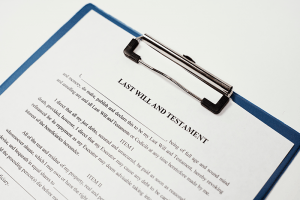
Financial Tasks To Be Undertaken To Prepare A Will
Among the first questions we ask of our clients is:
- Do you have any investments or insurance that permit a designated beneficiary?
If so, we immediately encourage our clients to be sure to notify the investment and insurance Broker of their wish and follow up to be sure it is completed. There is nothing like throwing money away on Probate fees for no good reason.
So, while you are thinking about it and commit to taking the time to save taxes one of the fastest and easiest ways yet, consider the following financial tasks to prepare a Will…
- Check your beneficiaries
- Update your insurance Broker
- Check your other potential designations on death
- Record your safety deposit box and check its contents; and
- Don’t forget power of Attorney.
Check on Your Beneficiaries
Updating your beneficiaries is important. Think about this: a spouse dies just after a divorce and an ex-wife rather than the children receive the proceeds and pension plan because the beneficiaries had not been updated in key financial accounts. You can often check and change beneficiaries online, or you may need to call your broker/adviser (investment and insurance) to request appropriate forms, but it is a key annual activity not to be overlooked.
Update Insurers and Your Heirs
Insurers don’t often pay out life insurance proceeds until someone files a claim. But far too often, heirs are unaware that the money exists. Updating your contact information with your insurer also may prevent policies from lapsing. Many insurers will allow you to name someone who can be notified if a payment is overdue so they can find out.
There’s something here you need to digest. We keep saying Wills are usually good (which only means a review is necessary) for about 3-5 years. Given most term life insurance policies bump insurance premiums every five years of the insured’s age, if that is not a clear point to re-think your Wills, I don’t know what is. Pay attention to this. Circumstances change. Your Will may have to be as well.
You will want to keep the contact information for those backup people updated with the insurer as well.
Visit Your Safety Deposit Box
If you forget to pay your annual fee and your bank can’t find you, after a few years your safety deposit box will be drilled and the contents turned over to the government. Photos and documents could be destroyed and family heirlooms sold at auction. Visit your box once a year to make sure your payments and contact details are current. Leave clear instructions with your Executor or your heirs about where to find the box and its keys.
Create or Revise Powers of Attorney
Powers of attorney allow others to make financial and health care decisions for you if you become incapacitated. If you don’t have these documents, or designated people have died or are otherwise unavailable, your loved ones may have to go to court to take over. Spare everyone that pain by naming a backup person or two and reviewing the documents every year to make sure the people named can still serve.
Update Your Will
It protects your most important assets—your family. Without one, the courts—and not you—decide what happens to your assets. They can even decide what happens to your children. So make sure to use this checklist to keep your Will up-to-date and in good working order. A good rule of thumb is that you should review your Estate plan every 3 to 5 years or when there’s a big change in your life.
Calculate Estate Administration Tax Probate Tax Calculator
Want more information?
Are you interested in a consultation with Peter R. Welsh?
Contact me at Peter@SmartWills.ca
By telephone 416-526-3121
Register for our blog to get valuable tips and up-to-date alerts.
This material is for general information and educational purposes only. Information is based on data gathered from what we believe are reliable sources. It is not guaranteed as to accuracy, does not purport to be complete and is not intended to be used as a primary basis for investment decisions.



